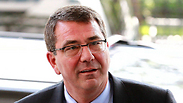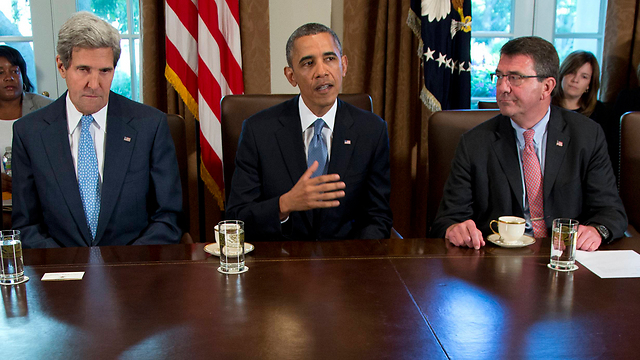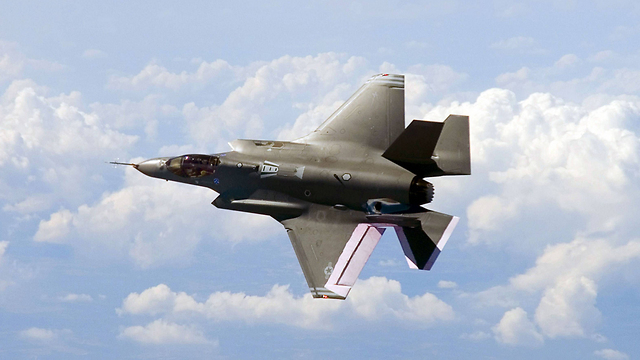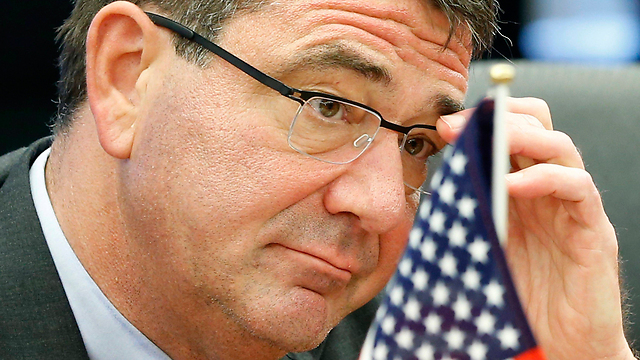
Obama nominates Ashton Carter to lead Pentagon
Dr. Carter, who helped secure F-35 deal for Israel, to become first armed forces chief with no military, poiltical background.
WASHINGTON – US President Barack Obama nominated Ashton "Ash" Carter, a 60-year-old Philadelphia native, as the 25th secretary of defense on Friday, subject to a Senate vote.
At the press conference, Obama said Carter was "rightly regarded as a foremost national security leader" and knows the Pentagon "inside and out," which means "on day one, he'll be ready to hit the ground running."
Unlike his predecessors, Carter has neither served in the US Armed Forces or the US Congress, but rose through the ranks of the academy – at Yale, Ofxord, and MIT – before embarking on a department of defense career during the Clinton administration.
A Rhodes Scholar at the University of Oxford, where he earned a doctorate in physics, Carter represents a breed of bureaucrat which has been never before attained the top slot at the department of defense, though he has served as assistant and deputy to three of his predecessors.
Unlike Leon Panetta and Chuck Hagel – who had previously served in the CIA and Senate, respectively – Dr. Carter is familiar with the massive bureaucracy at the department of defense and will likely experience an easy transition period into the demanding job.
The resigning secretary, Hagel, said Carter "possesses an unparalleled knowledge of every facet of America's defense enterprise, having worked directly and indirectly for 11 secretaries of defense over the course of his storied career."
Defense Ties
Carter has enjoyed excellent relations with Israel, working in full coordination with several director-generals of the Israeli defense ministry, and was responsible for initiating several one-on-one meetings between high-ranking Pentagon and defense ministry officials.
The incoming secretary of defense was also in charge of establishing the joint forum for coordinating weapon procurement and equipping Israel with the advanced F-35 stealth fighter.
The US eventually allocated three billion dollars for the purchase of 25 of the next-generation jets for the Israeli Air Force, but due to cost overruns, the American aid will only account for the procurement of 19 F-35s.
Speedy confirmation
Senator Carl Levin (D-MA), who serves as the chairman of the Senate Committee on Armed Forces, said Carter was a good fit for the position. His likely replacement at the head of that committee, Senator John McCain (R-AZ), characterized Carter's nomination as a pick that could not be disputed.
The Senate confirmation hearings are expected to pass without incident – one of the likely reasons Obama chose Carter, along with his unquestioned credentials as a defense "hawk."
Another reason was the lack of enthusiasm for the open position, partially due to the morale-sapping Democratic defeat in the midterm elections and the beginning of Obama's term as a "lame-duck."
Dr. Carter will enter the top Pentagon slot knowing that President Obama micro-manages much of what occurs in the various executive departments.
Former secretary Robert Gates, who served under president George W. Bush and Obama, said he was surprised to discover on his visit to Afghanistan that the White House was in direct contact with generals on the ground.
Revolving door
After spending the majority of Obama's first term as undersecretary of defense for acquisition, technology, and logistics, Carter was promoted to deputy secretary under Panetta and Hagel. However, his difficult relationship with Hagel forced him to retire the position in 2013 and return to the academy, this time to teach at Stanford University.Carter earned his bachelor's degree from Yale University in 1976, but began working in the Pentagon as early as 1981, first as an analyst on missile defense systems, the nuclear weapons arsenal, and contingency plans for the US government in the event of nuclear war.
The future secretary of defense became widely known in the Pentagon as an expert on advances weapons systems, and came into prominence for sharply criticizing president Ronald Reagan's "Star Wars" missile defense initiative.
In 1994, Dr. Carter was nominated as assistant secretary of defense for global strategic threats under then-secretary William Perry, tasked with minimizing the nuclear threat posed by the nascent state of Russia.
During his time as deputy secretary for Obama, Carter was responsible for managing and leading the significant defense cuts necessitated by the financial crisis in 2009.
The future Pentagon chief has focused on nuclear issues for much of his career and supports the improvement of America's aging nuclear arsenal – a position fiercely opposed by liberals.
He is also considered a "hawk" because of his objection to Iran's nuclear ambitions, but it is not believed he will be able to influence decisions already taken by the Obama administration on Iran and Syria.
The Associated Press contributed to this report.













